Australia must develop a bit of “commercial mongrel” if the nation is to successfully build a thriving technology sector and to assist with the country’s economic growth, according to METS Ignited chief executive Adrian Beer.
Speaking on an InnovationAus webinar on building an Australian technology sector to drive economic growth, Mr Beer said local companies are developing innovative solutions, especially in sectors like mining, but keeping these internally and are not making the last stage effort to productise and commercialise the tech.
This needs to change and building this “commercial mongrel” into the national business culture could assist Australia’s recovery from the COVID-19 pandemic, he said.
“We’re missing the commercial mongrel. It’s not seen as okay to want to make a dollar out of technology, but if you don’t, how are you going to sustain a sector?”
“We’ve got this advanced capability in robotics and automation, and data and analytics. We have all those capabilities here but they’re not commercially available to everyone.”
To do this, Australia needs to simultaneously develop its modern manufacturing capability, something the federal government made a key focus in its recent October budget.
“There’s this great depth of technology that has come out of the resilience of multiple primary industries that are there for the taking, but they are dependent on having a modern manufacturing capability to support it, otherwise it won’t be sustainable,” he said.
“If we want to convert technologies that are available in our sectors and commercialise them locally, then we need an advanced manufacturing capability to do that. You can’t have one without the other.”
CSIRO chief executive Dr Larry Marshall said that a singular focus on commodities has “trapped” Australia, and the crisis this year is an opportunity to zero in on innovation.
“When we dig up a commodity, we can ship it overseas like we do with coal or we can add value to it. When we make that decision to do that here we create jobs and economic growth. There’s more profit in this which means we can pay higher wages and get a better economy,” Dr Marshall said.
“When you’re on a 30-year up and to the right (growing) economy, there’s not much motivation to change everything. Enter COVID-19, and we had a really good reason to make things here again, and to do that in a really innovative way. There’s a real lesson here.”
In the mining sector, innovation is often connected to outputs rather than commercial products, and IP is often locked up in one company, without the benefit of competition or being in the marketplace, Mr Beer said.

“One of the challenges that is historical is the ownership and protection of IP that comes with developing that innovation for a competitive advantage. In the large producers, the innovation they developed on their own isn’t being advanced in a commercial marketplace because they hold it in their own IP,” Mr Beer said,
“There isn’t a competitive marketplace of vendors improving technology and advancing capability. But now those companies are seeing that they need a marketplace for that technology to scale and grow. They are now releasing that IP and making it more available in the local market.”
There is an incredible opportunity now to properly back Australia’s innovation sector, Cicada Innovations chief executive Sally-Ann Williams, who also appeared on the panel, said.
“We have a once in a lifetime opportunity to harness that and look at where the capabilities lie in our system – industry, universities, CSIRO and startups – and connect the dots and say we’re going to supercharge this,” Ms Williams said on the webinar.
“We’re going to get behind it and with money, resources and infrastructure and remove the impediments that would mean it’d take 20 to 30 years to market, and we’re going to supercharge it.”
There’s too much emphasis on adopting overseas technologies – even from the Prime Minister – rather than building them locally and reaping the benefits, Ms Williams said.
“I don’t think industry in Australia has the appetite historically or the track record of building things here. They love to adopt it and they’ve missed the boat for a very long time in thinking about building here,” she said.
“Industry in Australia is nowhere near there. Most of our industry is not investing at that level.”
This was backed by Robotics Australia non-executive director Sharna Glover, who said Australia is on a precipice and needs to start heading in the right direction towards creating new technologies.
“We don’t back ourselves, we don’t commercialise and we don’t seem to like our own developments. We will go and buy international products, and robotics is certainly one of those,” Ms Glover said.
“That really hurts us because we can’t develop a new growth industry which will generate jobs. We tend to buy overseas solutions. It’s really important Australia takes on some of its own products. We’re on a precipice – we’re not going the right way so we need to do something about it.”
Do you know more? Contact James Riley via Email.

